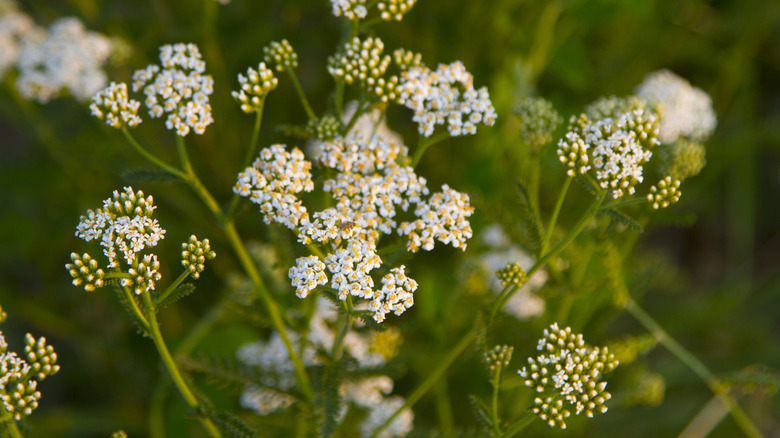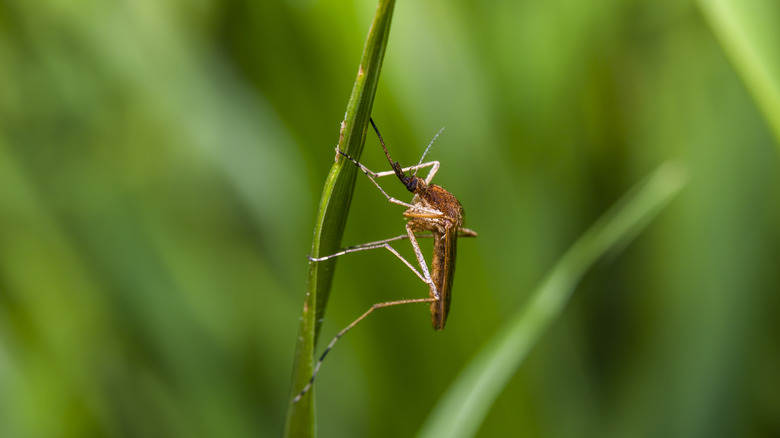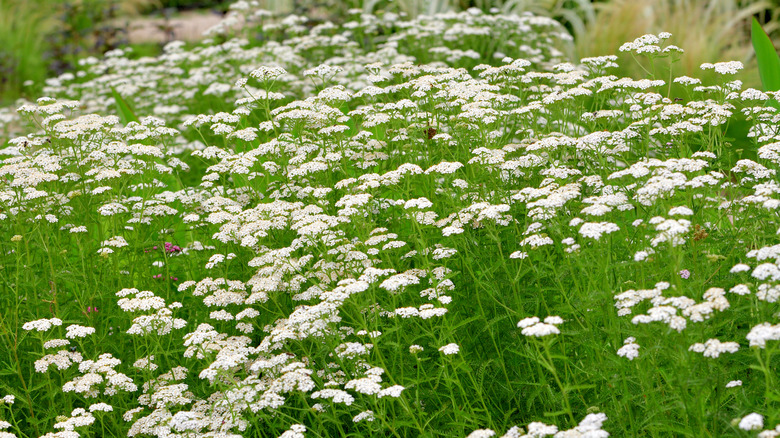Keep Mosquitoes Out Of Your Garden By Planting This Wildflower
Gardening enthusiasts constantly seek effective, natural solutions to keep pests away, especially mosquitoes. These tiny, irritating insects can turn a serene garden evening into an unpleasant ordeal. While chemical repellents are available, they often come with drawbacks, such as strong odors and potential health risks, which lead many to explore natural alternatives. Common kitchen spices like cloves can be used to deter the pesky insects, as can some simple baking staples. If you're looking for a repellent to use on the go, how about a natural lemongrass spray? But among the plants known for their pest-repellent properties, yarrow stands out as both an aesthetically pleasing and functional choice.
Yarrow, with its feathery foliage and clusters of colorful flowers, is a hardy perennial that can thrive in various garden conditions, from dry, poor soils to rich, well-watered beds. Its ability to adapt to different environments makes it an ideal candidate for any garden. But what makes yarrow particularly intriguing is its role in keeping mosquitoes at bay. This species not only adds visual interest to your plot, but its natural compounds also serve as a deterrent to these insects, reducing the likelihood of bites and the spread of mosquito-borne diseases.
Beyond its mosquito-repelling abilities, yarrow can also enhance soil health. Specifically, it acts as a dynamic accumulator that draws nutrients up from the soil, making them more available to nearby plants. This multifaceted plant offers numerous benefits, from pest control to soil improvement, making it a must-have for gardeners looking to create a balanced, healthy ecosystem.
Mosquito-repelling properties and other benefits of yarrow
Yarrow (or Achillea millefolium) has been valued for centuries for its beauty and its medicinal and practical uses. One of its lesser-known but highly effective benefits is its ability to repel mosquitoes. Yarrow contains natural compounds such as camphor, eucalyptol, and borneol, which emit a scent that mosquitoes find repellent. These compounds are released into the air from the plant's foliage and flowers, creating an invisible barrier that deters the insects from entering the area.
In addition to camphor and eucalyptol, yarrow contains other essential oils that also contribute to its insect-repelling properties. These liquids can be extracted and used to make homemade sprays or added to candles for additional protection during outdoor gatherings. Yarrow's efficacy at keeping mosquitos away is enhanced when planted alongside other insect-repelling plants, creating a multi-layered defense against pests.
Moreover, yarrow is known to attract beneficial insects like ladybugs, which prey on other garden pests such as aphids, further contributing to the overall health of your garden. The plant's deep roots also help prevent soil erosion and improve soil structure, making it an environmentally-friendly option for pest control. Incorporating yarrow into your garden is a natural, chemical-free way to reduce mosquito populations while also supporting a thriving ecosystem that benefits both plants and beneficial insects.
How to incorporate yarrow into your garden
Yarrow can become invasive if not managed properly, spreading quickly through its extensive root system and potentially overtaking garden beds and crowding out other plants. Planting this wildflower in your container garden is an effective way to control its growth while still enjoying its benefits. When potted, it can be easily positioned around your garden or patio, allowing you to move plants around as needed. This approach keeps the species contained, preventing it from spreading uncontrollably and ensuring a balanced garden ecosystem.
To maximize its effectiveness, consider planting yarrow in areas where you spend the most time outdoors, such as around patios, decks, or garden seating areas. The species' vibrant flowers — ranging from white, yellow, pink, and red — add tons of visual appeal to your garden. When choosing a location for your yarrow, opt for a sunny spot with well-drained soil. It also pairs well with other mosquito-repelling plants like lavender, marigold, and basil.
Although yarrow is drought-tolerant, it will thrive and bloom more profusely with occasional watering during dry spells. The plant's ability to attract beneficial insects such as hoverflies and parasitic wasps helps to control pest populations naturally, reducing the need for chemical pesticides. Yarrow's long blooming season of six to eight weeks ensures continuous protection against mosquitoes, making it an excellent choice for low-maintenance gardens that still provide effective pest control.


